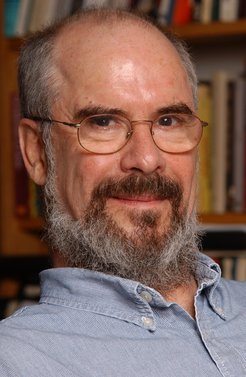"Making Ricardo and Marx matter”: a lively discussion in the “Meet the Author” with Duncan Kennedy

One definite highlight at the mpilhlt in April was the online event with Duncan Kennedy. Marietta Auer invited Duncan Kennedy, Carter Professor of General Jurisprudence, Emeritus, at Harvard Law School, to discuss his paper on 'Law Distributes I: Ricardo Marx CLS' with a number of scholars from the mpilhlt, the Goethe University and many other institutions. Kennedy, one of the founders of the Critical Legal Studies movement, proposes in this article that David Ricardo (1772-1823) and Karl Marx (1814-1883) in a sense are progenitors of one of the contemporary CLS approaches to law and political economy. Reformulating their ideas in contemporary, ‘post-realist’ terms, he develops an approach that focuses on 'distribution rather than efficiency and to the importance of transformable background rules of public and private law rather than to politically unattainable reform by tax and spend, large scale reregulation or decommodification'.
Instead of simply recapitulating the content of the text, Kennedy opened the session by listing multiple points he considered most relevant in the analysis and discussing their significance. Once he finished, Christian Boulanger, Johan Horst, Susanne Paas and Ralf Seinecke, all researchers in the Department Multidisciplinary Theory of Law, commented on the text and posed insightful questions. Responding to Kennedy’s claim that distribution ‘emerges from bargaining structured by the contingent and incoherent ensemble of legal rules’, it was questioned whether distribution is really the result of contingent rules, or if a specific legal form might instead be responsible. This of course kicked off a lively discussion of several topics, including the clear focus of this paper on the US legal, political and social context, what it is like to be a ‘post-realist’ thinker, his anti-Habermas leanings, among others. Despite the broad range of issues debated, however, it was Kennedy’s specific suggestions regarding strategies for legal activists to bring about an egalitarian distributional change as well as economic and social reconstruction benefiting oppressed and exploited people that received the most attention. This prompted the question about the possibility of empirically testing the effectiveness of such an approach, not to mention pointing to the responsibility this would entail for legal scholars when advising people what to do. Last but not least, the question of universalisation was another point repeatedly brought up during the event. Given Kennedy’s critical stance toward universalist approaches, it was asked whether his own three principles – ‘don’t target innocents’, ‘when you can’t avoid hurting them, observe an idea of proportionality in terms of the gains obtained at their expense’ and ‘excessive force is wrong no matter the provocation’ – don’t beg the question of universalisation. Admitting that it was more or less impossible to completely avoid universalisation, he feels that his three ‘notions’ don’t rise to this level because they don't make such a claim and, more importantly, are meant to be checked against actual situations.
